The CMIP Panel and Working Group on Coupled Modelling (WGCM) recently met in-person as part of the first meeting of the WCRP Earth System Modelling and Observations (ESMO) Core Project kindly hosted by Deutsche Klimarechenzentrum (DKRZ) in Hamburg. Key outcomes were the endorsement of the CMIP AR7 Fast Track experiment selection, progress on science goals, agreement on scoping of a more regular and sustained CMIP, and updates from the CMIP7 task teams.

Endorsement of the AR7 Fast Track
An important aim of the wider CMIP Panel meeting on Monday 18th March was to finalise the proposed experiment selection of the AR7 Fast Track after extensive consultation with the CMIP community in recent months. Reflecting carefully on the input from the modelling centres and wider community, the Panel confirmed their experiment selection, including additions to the DECK, which was presented to and endorsed by the WGCM at their meeting later in the week. Further details on the CMIP AR7 Fast Track can be found here.

The Panel and WGCM members recognised the ambitious timeline for delivery of the Fast Track to meet the anticipated but as yet unconfirmed IPCC deadlines. However, they were encouraged that nearly all modelling centres indicated their intention to contribute, many with next generation models, in the AR7 Fast Track v2 survey in February 2024.
Given the AR7 Fast Track dependence on timely delivery of forcings and the data request, updates from these task teams was eagerly anticipated, and the current progress well received. The CMIP Forcings Task Team is actively working towards delivery of a testing-ready updates by mid-year (latest timeline here), and the Data Request Task Team has established five thematic teams to define a collection of harmonised variables. Plans for development of guidance were also on spin up, emissions driven model configuration strategy, and potential coordination of the Fast Track ensemble across the modelling centres was also discussed in the Strategic Ensemble Design Task Team update.
Discussion of science goals
Discussion on the science goals framing the AR7 Fast Track was accelerated with a core CMIP Panel brainstorming session resulting in the following:
PATTERN EFFECT: How do forcings, feedback mechanisms and natural variability interact and to which extent can we explain historical patterns of climate change and predict/project future ones?
EXTREMES: How do weather patterns evolve with warming and how do these changes translate into changes in climate extremes and associated impacts?
CARBON CYCLE: What CO2 emission trajectories align with climate stabilization objectives, considering both the influence of natural marine and terrestrial carbon sources and sinks and potential for anthropogenic carbon dioxide removal?
TIPPING POINTS: What are the risks of crossing tipping points or triggering irreversible changes in future climate change scenarios, particularly in the context of overshoot?
These goals will be refined over coming months. Opportunities for engagement with the Community MIPs, and wider community are under development by the CMIP IPO. To keep up to date with the latest news and event please sign up to the CMIP mailing list.
Engaging with ESMO
The co-location of the CMIP Panel meeting with the first meeting of the ESMO Core Project offered great opportunities for discussion and exchange of ideas, and importantly reducing potential for duplication of effort. Topics of shared interest included collaboration across the modelling communities, modelling-observations interface, data delivery and access developments, and the question of “operationalising” climate projections.
This “operationalisation” topic was discussed enthusiastically in sessions across the CMIP Panel, WGCM and ESMO highlighting the different interpretations of definition of “operationalisation” and its potential implementation. Responding to these discussions, the WGCM endorsed a CMIP Panel recommendation for a scoping report by early 2025 on viability and potential mechanisms of a regularised and sustained model of key CMIP output delivery. The WGCM, CMIP Panel and WGCM Infrastructure Panel (WIP) co-chairs have started the develop the scoping outline and will be engaging with relevant communities of forcings, modelling centres, infrastructure providers, and stakeholders in the coming months.
Thank you to our Data Citation Task Team
Data citation enables credit to be given to CMIP data creators, compliance with author guidelines by data referencing and IPCC FAIR Guidelines and facilitates data impact information. The CMIP7 Data Citation Task Team, led by Martina Stockhause (DKRZ) and Sasha Ames (LLNL), presented their recommendation for a sustainable data citation service to the CMIP Panel highlighting the current lack of funding for data citation services as a key risk to tracking CMIP impact. The WIP and Earth System Grid Federation (ESGF) governance are now reviewing the recommendation. The Panel would like to thank the co-leads and members of the Task Team for their valuable contributions.
Final reflections
Reflecting on the week in Hamburg CMIP Panel Co-chair, John Dunne
“The passion and commitment to bring together our global community of Earth system scientists to address critical science and societal challenges associated with climate change was on full display in Hamburg and is truly inspiring.”
Thank you to the CMIP IPO and ESMO IPO coordinators, and local DKRZ hosts for a successful event!
